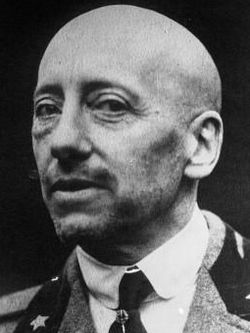
General Gabriele D'Annunzio, Prince of Montenevoso (UK: , US: , Italian: [ɡabriˈɛːle danˈnuntsjo]; 12 March 1863 – 1 March 1938), sometimes written d'Annunzio as he used to sign himself, was an Italian poet, playwright, orator, journalist, aristocrat, and Royal Italian Army officer during World War I.
He occupied a prominent place in Italian literature from 1889 to 1910 and in its political life from 1914 to 1924. He was often referred to by the epithets il Vate ("the Poet"; the Italian vate directly stems from Latin vates, and its meaning is a poet with special emphasis on prophetic, inspiring, or divining qualities) and il Profeta ("the Prophet").
D'Annunzio was associated with the Decadent movement in his literary works, which interplayed closely with French symbolism and British aestheticism. Such works represented a turn against the naturalism of the preceding romantics and was both sensuous and mystical. He came under the influence of Friedrich Nietzsche, which would find outlets in his literary and later political contributions. His affairs with several women, including Eleonora Duse and Luisa Casati, received public attention. In his politics, which evolved many times, he associated himself with socialism and the progressivist views of the political left, responding to the illiberal and reactionary policies of Luigi Pelloux, as well as with the Historical Far Left.
During the Great War, D'Annunzio’s image in Italy transformed from literary figure to national war hero. He was associated with the elite Arditi storm troops of the Italian Army and took part in actions such as the Flight over Vienna. As part of an Italian nationalist reaction against the Paris Peace Conference of 1919, he set up the short-lived Italian Regency of Carnaro in Fiume with himself as Duce. The Charter of Carnaro made music the fundamental principle of the state, which was corporatist in nature. Although D'Annunzio later preached nationalism and never called himself a fascist, he has been credited with partially inventing Italian fascism, as both his ideas and his aesthetics were an influence upon Benito Mussolini. At the same time, he was an influence on Italian socialists and an early inspiration to the first phase of the Italian resistance movement to fascism.
Source : Wikipedia